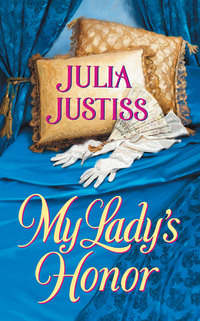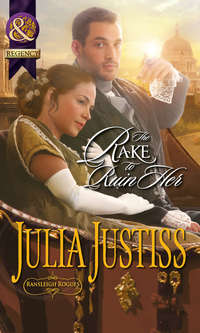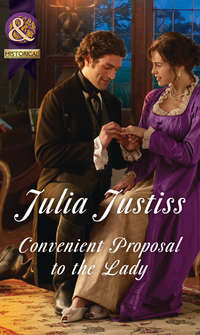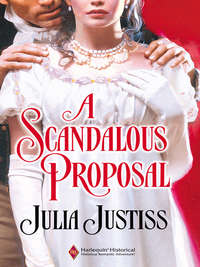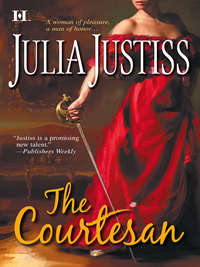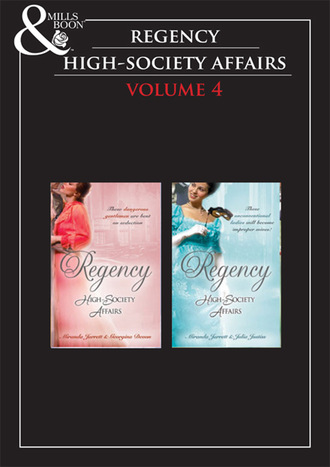
Полная версия
Regency High Society Vol 4
Her baby name, Rusa, had sounded exotic and foreign the way he said it, so soft and slurred and indolent that she wished she’d never let him hear it; one more thing he’d stolen from her. He laughed softly again, and though Jerusa couldn’t see his face, she could imagine his mocking smile well enough to make her cheeks grow warm.
“Ah, ma chère, I’ve never yet lied to you,” he said with amused regret, which she was certain was quite false, “yet you will never believe me.”
“Then tell me the truth. Tell me why you kissed me.”
“So easy a test, sweet Rusa, so easy!” He kept her in breathless agony while he murmured to the gelding in French. “I kissed you because we both wished it.”
“That’s not true!”
“You see how it is? I could not be more truthful, and yet you won’t believe me.”
A fresh gust of wind rushed through the doorway with a swirl of leaves, ripped from their branches, and as the mare’s nostrils flared, Jerusa caught the same scent of coming rain and salty air blown east from the sea. Abigail arched back, and Jerusa forgot answering Michel as she struggled again with the mare.
Then, from the yard outside, came a loud, sizzling crackle followed by a hiss like a hot poker in cold water, then the brittle explosion of splintering wood.
Her heart pounding, Jerusa whipped around toward the noise in time to see the last standing wall of the abandoned house burst into flames around the white ball of lightning. In an instant the dry timbers became a solid sheet of fire, the flames urged faster by the wind. As she watched, the first sparks spun through the curling smoke to the roofless henhouse, and that, too, soon grew bright with fire.
And directly to the west, next in the fire’s path, was the barn.
Michel was shouting to her, but as she turned toward his voice, Abigail plunged back and ripped herself free of Jerusa’s grasp. Frantically Jerusa lunged for the halter again, and as she did, the mare tossed her head and caught Jerusa’s side beneath her raised arm.
Almost as if it came from someone else, she heard the odd, hollow sound she made as the wind was knocked from her. In disorienting slow motion she felt herself lifted from her feet and into the air, until, with a leaden thump, she fell to the hard earthen floor of the barn. There she lay, gasping for breath, every inch of her body hurting. But as she struggled to make her lungs work again, the only air she could find was acrid with smoke, burning her eyes and nose.
“Jerusa?” shouted Michel, fighting to control Buck. “Jerusa!”
Where was the girl, anyway? Why the hell didn’t she answer? The barn was filling with smoke from the burning house, and it would be only a matter of minutes before the wind would drive the flames this way. He tore his arms free of his coat and tied it across the gelding’s white-ringed eyes.
“Come along, Buck, we’ve tarried here long enough,” he said as he led the horse from the stall. They’d have to pass directly past the fire, and he prayed the horse wouldn’t balk. “You’re a brave fellow, and I know you can do it.”
Coughing from the smoke, Michel guided the horse toward the door. Another flash of lightning, another deafening crack of thunder and he nearly lost his grip on the horse. He heard Abigail’s terrified whinny, and in the split second of lightning, he caught a glimpse of the mare alone in her stall. But where the devil was Jerusa?
“Just a few paces more, Buck, a few more,” he coaxed, and then they were out of the barn and in the yard. As swiftly as he could, he ran with the horse to a tree well beyond the fire’s reach, to the east, and tied him there. At last the first fat drops of rain were beginning to plummet from the clouds to hiss into the flames, and as Michel raced back across the yard, he prayed the rain would end the fires.
He stopped at the door of the smoke-filled barn, tying his handkerchief over his nose and mouth. The mare would be easy to find, pinned by terror in her stall. But where was the girl?
He shouted her name again, and again came no answer. Maybe she’d already fled the barn, determined like every Sparhawk to save herself first, but even as Michel considered the possibility he dismissed it. Jerusa wouldn’t do that. She’d come to care too much for that foolish mare to abandon her now. She had to be in here somewhere, hidden by the stinging, murky clouds of smoke.
Sacristi, why had he been burdened with a silly chit who’d risk her life for the sake of a secondhand horse?
He felt his way to Abigail’s stall, stroking the trembling mare’s foam-flecked neck as he covered her eyes with his coat the same way he had with the gelding.
“Where is she, Abigail?” he asked softly as he led her forward. “Where’s our Jerusa, eh?”
The mare balked and shied, and then Michel heard the coughing. She was on her hands and knees on the floor, swaying as she struggled to breathe. He grabbed her around the waist, and she sagged against him, and together they staggered the last few feet to the open air.
Outside the barn, Michel pointed Abigail toward Buck, pulled the coat from her eyes and left her to join the gelding on her own. He slipped his arm beneath Jerusa’s knees and carried her, still coughing, to the little stand of maples where the horses waited.
Gently he settled her on the grass, slipping his coat protectively across her shoulders as she still coughed and gasped for breath. Her eyes were red rimmed from the smoke, making the irises seem even more green by contrast, and the rain had flattened her hair and blotched the soot that covered her face. But because she was alive, to him she’d never looked more lovely.
“You’ll be fine, ma chère,” he said, trying to smile. She had frightened him badly, more than the fire itself and more than he wanted to admit. He’d come so close to losing her, and though he tried to tell himself it was only for his mother’s sake, deep down he knew the truth, and that, too, frightened him. “It hurts now, I know, but you’ll be fine.”
Jerusa nodded, all the answer she felt able to give. She sat curled over her bent knees, holding her side where Abigail’s nose had struck her. Her lungs still stung from the smoke, but each breath seemed to come a little easier. She was sure her side would be purple and sore for at least a week, and she touched herself gingerly, praying she hadn’t cracked any ribs. She wasn’t about to complain to Michel and have him go cutting her clothes off again to tend to her.
She looked back at the fire, more smoke now than flames, thanks to the rain. The last wall of the house, the one that had been struck by lightning, was completely gone now, and only the stone chimney remained like a lopsided pillar against the sky. The rain had spared the barn, but, even with the wind, the air was still thick with the smell of burning wood, and she shivered as she thought of how near she’d come to dying through her own carelessness with Abigail.
Michel handed her a cup of water and she drank it gratefully, the well water deliciously cool as it slid down her raw throat. He, too, was smudged with soot, and one sleeve of his shirt was torn nearly the length of his arm. He’d lost the ribbon to his queue, which allowed his hair to fall loose around his face, and small black scorched spots left from cinders peppered his waistcoat. Whatever his reasons, he’d clearly risked his life for her, and no one else had ever done that. Certainly not Tom Carberry.
“There now, I told you you’d feel better,” said Michel softly. With one finger he brushed a lock of her hair from her forehead. She was a brave little woman, he thought with fond admiration. He couldn’t think of another who would have stayed with the horses, as she had. “No real damage, eh, ma mie?”
Though he smiled, weariness had deepened the lines around his eyes and made his accent more pronounced. She doubted he’d rested at all while she’d been asleep.
“Thank you,” she whispered, her voice breaking. “You didn’t have to come back for me.”
“Don’t thank me, ma chérie.” He winked wickedly. “I came back for Abigail.”
She tried to laugh, but all that came out was a croaking bark. “Then I thank you for Abigail’s sake. She’s unharmed?”
“She and Buck both. You can see for yourself how happily they’re grazing now, without an anxious thought in their heads. Horses can be charming, useful creatures, but they’re not particularly fearless in a fire.”
“Who is?” Her smile faded as she pulled his coat higher over her shoulders. Though she didn’t really need the coat’s warmth, she wasn’t yet ready to give up the security and concern—Michel’s concern—it represented.
“You knew, didn’t you?” she said quietly. “We didn’t lose a thing because you had the horses saddled and ready, even though we weren’t supposed to leave until dusk. Somehow you knew.”
He shrugged carelessly. “A guess, that was all. The high ground, the fact that the house had suffered from fire before, something in the air that felt like a storm. But don’t look at me like I’m a sorcerer, chère. If nothing had come of it, then I would have looked the fool, not the wise man.”
Of course it had been more than that. From the beginning, the place had made him uneasy in ways he didn’t want to explain. He looked past her to the smoldering ruin of the farmhouse and imagined again the empty, charred walls of his father’s house.
No, he didn’t want to explain that to her at all.
She brushed her fingers across the grass beside her and wondered what had made him fall silent. She wished he hadn’t. The terror she’d felt when she’d been lost in the smoke was still very real, and talking had helped her forget. Talking to him.
“If you’ll only take credit for saving Abigail’s life,” she said slowly, “and not mine with it, will you let me at least thank you for that?”
He raised his brows with feigned surprise. “A Sparhawk offering thanks? What’s happened to your pride, Miss Jerusa?”
“Oh, hang my pride, Michel, and let me be grateful!” Before she lost her nerve she leaned over and kissed him quickly, her lips barely grazing his. She sat back on her heels, breathless at her own daring, and unconsciously licked her lips as if to taste the fleeting memory of his.
He looked at her blandly. “Were you telling the truth that time?”
“About what?” she asked, flustered by the way he seemed to be studying her mouth. “About being grateful?”
“Of course not, ma chère. About kissing me. That tiny souffle was so slight I’m not sure but that I imagined it entirely.”
“You don’t believe I kissed you?”
“I don’t know what to believe, ma mie, not where you’re concerned.”
“It’s not as if I’m in the habit of kissing every man I see, you know,” she said indignantly. “But I’d have thought you’d have the decency to believe it when I did!”
He smiled with lazy charm, his teeth a white slash against his dark beard and soot-smudged face. She didn’t have to defend herself so vigorously—he’d known from the start that her bumbling popinjay of a fiancé hadn’t taught her a thing—but at least she’d forgotten entirely about the fire.
And so, for that matter, had he.
“I told you before, Rusa, I’ve never lied to you,” he said. “Decency or not, I haven’t begun now.”
With an exasperated grumble she threw herself against him, seizing his shoulders to steady herself as she planted her lips soundly against his. There, she thought triumphantly, he wouldn’t forget that!
But suddenly his mouth was moving against hers in a way she hadn’t intended at all, surely, seductively, and she forgot all her triumph as his lips slanted across hers to deepen the kiss. She shuddered as his tongue invaded her mouth, teasing and tasting her in dizzying ways she’d never dreamed possible. Shyly she let herself be led, echoing and responding to his actions until she realized that he, too, felt this other fire flaring between them.
Her fingers tightened into the hard muscles of his shoulders beneath the soft lawn shirt, and when she felt his hands circling her waist and spreading across the soft curve of her hips, she let herself be drawn closer to his body, relishing the new sensation of him beneath her. She was alive, gloriously alive, and he had saved her for this. He pulled her back with him onto the grass and she kissed him hungrily, as if she were famished, as if she hadn’t feasted on strawberries or—
Dear Almighty, what was she doing? Abruptly she tore her mouth away from his, pushing herself up on her arms to stare down at him. Her heart was pounding and her body ached in strange places that had nothing to do with her fall, and, to her shame, she realized she was sprawled across his body with her legs spread on either side of his.
“Oh, Michel,” she said breathlessly, unable to think of anything else to say as the color flooded her face. “Oh, my goodness.”
He laughed softly, and she felt it vibrate through her own body before she hurried to untangle herself from him. “Ah, Rusa, now I believe you’ve kissed me.”
Chapter Nine

With the storm done, Jerusa scarcely met Michel’s eyes as they prepared to leave. Even when for the first time he’d made a tiny fire so he could offer her tea, real, hot tea from his saddlebag, her thanks was no more than a swift, curt nod.
But he knew what she was doing as clearly as if she’d spoken. More clearly, maybe, than she did herself. Self-righteously she believed that he’d tricked her into kissing him so that she could blame him for the fact that she had enjoyed it as much as she had.
He hadn’t been quite that devious, but he’d admit to taking advantage of the opportunities that life—and pretty, sooty women—offered him. Why shouldn’t he? She had been the one to kiss him. What harm could possibly come from a single kiss?
At least that was what he tried to tell himself, and that was where his own confidence faded. Jerusa wasn’t some merry barkeep’s daughter or femme du soir who forgot each passing pleasure as soon as she found the next one. No, Jerusa Sparhawk was his enemy’s daughter, and she was supposed to be his prisoner. So why the hell was he rolling around in the grass with her like some besotted farmer on market day?
But it was worse than that. Much worse. Kissing her was unlike kissing any other woman in his life. She was hotter, sweeter, more fascinating, more beguiling. The innocent eagerness she’d shown with him today had very nearly shredded his self-control, the untapped passion of her lush young body crying out to be freed.
Yet if her passion could burn him with pleasure hotter than any fire from lightning alone, then it could also scorch a path to his soul if he let it. And he wouldn’t. All he had to do was look at his mother to see the disastrous results of loving and caring. Love led to ruin and madness and pain that lasted forever, and he wanted no part of it. He’d spent his whole life carefully building a wall of indifference around himself as protection. He wasn’t about to tear it down for the sake of one spoiled little English virgin who would cringe with horror when she finally learned who he was.
He looked at her graceful profile, staring resolutely ahead as she rode beside him. He must not forget who she was again. There would be no more kisses, no more dallying on the grass.
No more caring.
They had not been riding a quarter hour before they saw the dim shape of the other horses coming toward them on the road ahead. Four horses, guessed Michel, four riders, four men he’d no wish to meet, and he swore to himself.
Jerusa looked at him sharply. “What’s wrong?”
“Company, ma chère.” He pointed toward the horizon ahead. “Four men at least coming our way. I know why we travel by night, but I’m not sure I want to know their reasons, too.”
She understood at once; no decent men would be on the road at this hour. “We can run, can’t we? The horses are fresh.”
“In this open country? No, if we’ve seen them, then they’ve seen us, and there’s no help but to meet them.” He was glad he’d checked his powder after the rain. Not that he intended to use the pistols, but it was comforting to know the guns were there if he needed them. He sighed and smiled wearily at Jerusa. “You’re not frightened, are you?”
She shook her head quickly, and he thought of how much she’d changed. Only a few days ago she would have been racing up to meet the others, shouting about how she was one of Newport’s own anointed Sparhawks.
“Good girl. Let’s pray they’re as anxious to be on their way as we are.”
As the two parties drew closer together, Michel slowed his horse to a walk and Jerusa followed.
“Good evening, sirs!” he called in his best bluff English. “Good evening, friends!”
The others slowed, too, then stopped. In the lead was a stout man whose white-powdered wig seemed strangely out of place on the open road as he stood in his stirrups to scowl down at them. The other three, servants or hired men, hung back a deferential distance. One more self-important provincial Englishman playing at being a squire in Connecticut, thought Michel irritably as he forced his face into a cheerful smile.
“My wife and I have passed through a dreadful storm not an hour ago,” he said to the man in the wig. “Can you tell us, pray, if there’s a decent inn or ordinary to be found in this neighborhood?”
“Do I look like an innkeeper to you, sir?” the other man demanded. “I am Dr. Richard Hamilton, sir, and I’ll have you know you trespass on my land.”
Briefly Michel lifted his hat from his head. “Michael Geary, sir, your servant, and my wife, Mrs. Geary. If we trespass, Dr. Hamilton, I assure you it is through no intention to do you harm.”
Hamilton peered at Jerusa, striving to see her face, and it took all her resolve not to draw away. He might not have been the highwayman she’d feared, but still she didn’t like him one whit, and she trusted him even less. When Michel had first spotted the other horsemen, she had fleetingly considered throwing herself on their mercy. Now, after meeting Hamilton, she was glad she hadn’t.
“Mistress Geary, ma’am,” said Hamilton with a grudging, cursory nod, before he turned back to glare at Michel. “What is your destination, Mr. Geary?”
“New York, sir, to visit my wife’s people. We ourselves live in Massachusetts, in Essex County.”
“Queer sort of business, hauling your wife on horseback about the countryside like some damned tinker.” Hamilton grunted skeptically. “Why didn’t you go by water, eh? And where are your trunks? Never in my days have I seen a lady travel without trunks.”
“It’s our trunks that are sailing south, Doctor,” answered Michel easily. “We sent my wife’s gowns and other such that she’ll need to New York in my cousin’s coaster, while we ourselves, sir, prefer to travel lightly by land. It’s my wife’s choosing, you see. She has not the constitution for sea journeys, nor can she abide the closeness of a carriage.”
Jerusa listened in silence, amazed by the ease with which Michel spun one tale after another. Just as with the Faulks he had contrived to sound their better, now with this man he managed exactly to be a step or two lower, a prosperous tradesman, perhaps, or craftsman. He was so convincing that she almost believed it herself.
And so, more important, did Hamilton, who at last nodded. “Tell me, Geary. Did you pass a house afire to the east on this road?”
Michel’s eyes widened with appropriate wonder. “Why, yes, sir, we did at that! We had stopped for shelter from the storm at a ruin of a farm, only to have the old house struck by lightning even as we watched. You’ve but to look at our clothing to see how near we were. A terrible sight, sir, awful to behold! Thank God in his mercy for sending the rain to douse the flames.”
“And thanks to you, Geary, for saving us the trouble of going there ourselves.” For the first time Hamilton’s lips curved in a smile, or what in a man like him would pass as a pleasantry. “That makes five times in as many summers that lightning’s found that spot.”
“Five times, sir!” Michel whistled low under his breath. “Five times is cruel of fate indeed.”
“‘Twas nothing to do with fate,” declared Hamilton with disgust. He turned in his saddle to stare contemptuously at one of the other men. “What kind of thick-witted oaf would choose the highest hill in the county to build his house? You deserved what the Lord sent you, Saunders, indeed you do, just as you deserved to lose the land itself. Be grateful I’m the one who bought it, else you wouldn’t even have the right to work the miserable plot.”
Saunders sank lower in his saddle with shame and misery, and Michel’s initial dislike of Hamilton swelled. He hated men like this, men who thought that gold and land gave them the right to grind down and humiliate everyone else less fortunate.
“‘Vous êtes un sot en trois lettres, mon fils,’” he said softly.
Hamilton jerked around to stare at Michel. “What the devil did you say?”
“‘You’re a fool in three letters, my son,’” he said levelly, translating for Hamilton’s benefit. “Or four, in English. Molière. It seemed appropriate.”
Jerusa almost gasped aloud. What didn’t seem appropriate was Michel saying such a thing, especially if he was pretending to be a respectable tradesman. Hamilton was a contemptible bully, but that was no reason for Michel to insult him.
But for some reason Hamilton didn’t seem to have even heard what he’d said. “No, before that, Geary,” he insisted. “What did you say? Did you dare to speak like a worthless, frog-eating bastard in my presence?”
Jerusa saw Michel stiffen. “Molière was a Frenchman,” he said softly, and to her ear he intentionally let his neat, clipped Boston tradesman’s accent slide in favor of the softer French of his birth. “A French gentleman, a playwright and a genius.”
“You’re one of them, aren’t you, Geary?” demanded Hamilton, his voice shaking with rage. “You couldn’t rattle off their lingo so neat otherwise. I lost two sons to the French swine in the last war. Two fine, honest, English boys, dead because of you! And now you dare to come on my very land to mock me, nay, to burn and destroy my very property!”
Hamilton fumbled to unfasten his coat and Jerusa saw how swiftly Michel’s hand slid down to his belt with the pistols. Dear Almighty, in another minute they’d begin shooting at each other, unless, unless…
“You believe my husband is French, Dr. Hamilton?” she asked incredulously as she urged Abigail forward between the two men. “French?”
Hamilton jerked his head back to look at her, his eyes popping beneath his brows, clearly annoyed that she’d dare interfere. “Aye, mistress, I do.”
“Then you should consider your words before you speak, Dr. Hamilton,” she said tartly. “My own father sailed in a privateer in the old French war, sending more than his share of Frenchmen to their graves in the Caribbean, and my brothers, too, whenever King George has given them the chance.”
“Most admirable.” Hamilton snorted with scorn. “How then do you explain your bastard of a husband’s speechifying, eh? He prattles away in their infernal tongue as if he were born to it!”
She forced herself to laugh. “Then my husband has fooled you as he hopes to fool others. He has high-flown hopes to rise above his station, you see, and fancies that because the gentry speak French, then he shall, too. His teacher is but a dancing master on our street who feeds his foolishness for our hard-earned shillings.”
Hamilton scowled beneath his white wig. “You speak the truth, mistress? You do not mock me?”
“La, it’s he who mocks me, Dr. Hamilton!” she said with a toss of her head. She was sure now he believed her, for despite his scowl, his body had relaxed and lost its tension. “For myself, I would no more take a Frenchman for a husband than I would an ape.”


